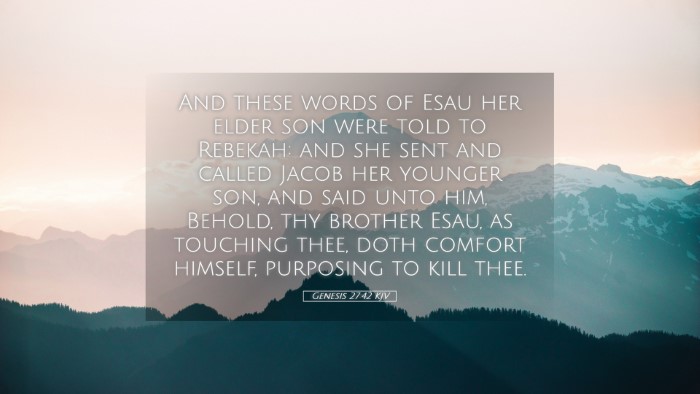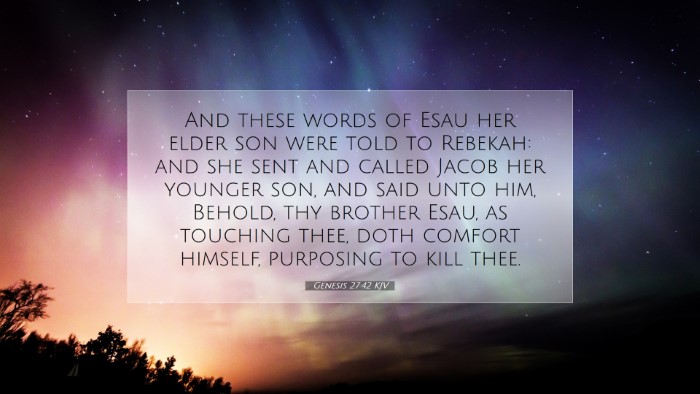Commentary on Genesis 27:42
Verse Text: "And these words of Esau her elder son were told to Rebekah: and she sent and called Jacob her younger son, and said unto him, Behold, thy brother Esau, as touching thee, doth comfort himself, purposing to kill thee."
Introduction
This verse serves as a critical juncture in the narrative of Jacob and Esau, encapsulating themes of familial strife, deception, and the sovereign plans of God. The words of Esau reflect a deep sense of betrayal and anger, while Rebekah’s response is indicative of her protective nature and insightful understanding of the unfolding drama. The insights from various public domain commentaries provide a deeper understanding of the theological and practical implications of this passage.
Contextual Background
- The Family Dynamics: Rebekah and Isaac are central figures in this narrative, with their sons embodying contrasting characteristics—Esau, the hunter, represents physicality and earthly pursuits, while Jacob embodies cunning and ambition.
- The Birthright and Blessing: The preceding chapters provide crucial context. Jacob’s acquisition of Esau’s birthright and the deception of Isaac to receive the paternal blessing set the stage for Esau's rage and subsequent threats.
- The Role of Rebekah: As a mother, Rebekah is portrayed with complexity; she is both proactive and protective yet complicit in the familial discord.
Commentary Insights
Matthew Henry's Commentary
Matthew Henry emphasizes the gravity of the situation by noting that Esau’s feelings of betrayal lead him to the fatal decision of revenge. Esau's comfort in revenge, as noted by Rebekah, reveals a heart filled with anger rather than reconciliation. Henry points out that Rebekah’s swift action to protect Jacob demonstrates a mother's instinct but also the consequences of prior deceitful actions within the family.
Albert Barnes' Commentary
Albert Barnes focuses on the implications of Rebekah hearing of Esau’s intentions. He remarks that the act of informing Jacob signifies the ongoing tension and fear within the family. Barnes highlights the importance of communication in times of crisis, as it is Rebekah’s timely intervention that potentially saves Jacob’s life. He also reflects upon the irony, noting that Jacob, who sought to secure his place in the family through cunning, now requires protection due to those very actions.
Adam Clarke's Commentary
Adam Clarke offers deeper theological reflections on the damaging effects of favoritism and deception within familial relationships. He notes that Rebekah’s favoritism towards Jacob has dire repercussions, not only for the siblings but for the entire familial structure. Clarke asserts that the narrative compels readers to examine their own lives for instances of partiality and encourages a pursuit of unity and honesty within family ties.
Theological Implications
- Divine Sovereignty: This verse underscores the mystery of divine providence. Despite human actions of sin and deception, God’s purposes remain intact. Jacob’s journey, from deceit to eventual reconciliation, illustrates God’s overarching control over human history.
- The Nature of Conflict: The conflict between Jacob and Esau is emblematic of broader human struggles. Issues like jealousy, betrayal, and revenge find parallels in the experiences of many, making this passage universally relevant.
- Human Nature: The tender yet tumultuous relationship between family members is rooted in human nature, highlighting the need for grace and forgiveness in our lives.
Practical Applications
- Resolve Conflicts: Pastors and leaders may use this narrative to counsel families experiencing strife, emphasizing the need for resolution and reconciliation rather than revenge.
- Guard Against Deception: The story serves as a cautionary tale against manipulation and deceit in pursuit of one’s desires, reminding individuals of the inevitable consequences of such actions.
- Value of Communication: This passage highlights the importance of honest communication within families, especially during times of crisis, as Rebekah’s warning to Jacob illustrates.
Conclusion
Genesis 27:42 invites readers to reflect on the complexities of family dynamics, the cause and effect of deception, and the enduring sovereignty of God amidst human failings. Through the commentaries of Matthew Henry, Albert Barnes, and Adam Clarke, the rich theological and practical insights resonate deeply with pastors, students, and theologians alike. Perhaps most importantly, this verse and its commentary remind us of the need for ongoing repentance, seeking restoration, and understanding the profound grace of God in our lives.


